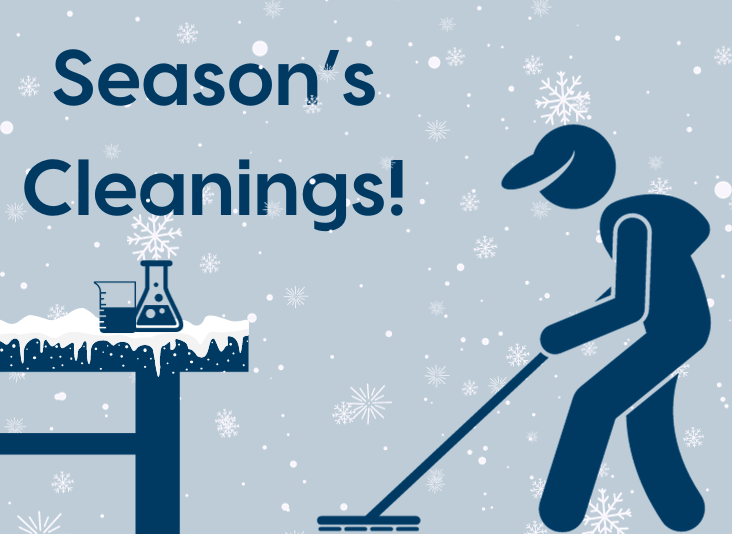Complete Your Summer EHS Projects Checklist Before Fall
School’s out for summer! Students are gone and campuses are empty. And because of this, it’s the perfect time to complete some crucial and resource-intensive summer EHS projects. At colleges and universities nationwide, preparations for the upcoming school year include scheduling and completing summer facility projects—annual tasks and future innovations—all before students return to campus.
Summer EHS Projects: Unique Opportunity
The summer intersession provides a unique opportunity to complete a long environmental, health, and safety (EHS) summer checklist of special maintenance and cleaning activities as well as be productive in addressing EHS needs. The low onsite headcount that summer break offers means:
Bigger, More Dangerous Tasks Can Be Completed
With fewer staff and students on campus, there is less of a concern about disrupting normal classes and other operations. Plus, with only a handful of campus activities and personnel onsite, safety considerations can be greatly reduced—there is simply less risk. Only EHS professionals and special projects teams will be anywhere near the work being done.
Projects Can Be Completed Faster
Without having to worry about only working off-hours to not disrupt classes, students, and other campus activities, summer EHS projects can be completed faster—there are just so many more hours in the day when work can be done. EHS teams can do more campus projects during summer break, saving time and money and allowing more summer EHS projects to be completed.
Cost Savings
Faster, more efficient work results in a smaller project price tag. But not only that, doing more to prepare your university for the fall semester will reduce preventable emergency repairs and upgrades, which can be costly.
All of this is to say that the unique intersession conditions mean:
- Remediation and maintenance work won’t come at the expense of productivity
- Work will be safer—fewer people mean fewer distractions and reduced risk
- Tasks like cleaning, repair, or relocation can be completed more quickly than at other times of the year
- More can be done, with greater control
Creating Your Personal EHS Summer Checklist
So, how do you start to create your facilities’ custom EHS summer checklist? This will happen through three main steps:
One: Make a list of all the summer EHS projects you need done
This may include summer EHS projects like:
Conducting a compliance audit
If a state or federal inspector arrived on your campus today, would your facility be in compliance? Unless the answer is a confident “yes,” a good summer EHS project is a compliance audit. An audit will ensure that your permits are up-to-date and that your campus is operating in accordance with all federal, state, and local regulations. Following a compliance calendar can help you stay on track during the summer break and throughout the year.
Cleaning and maintenance of wastewater and stormwater systems
Stormwater and industrial wastewater treatment system cleaning, when done incorrectly or without proper precautions, can cause operational or compliance problems. Perhaps as a result of this, or maybe as a result of hectic school calendars, wastewater treatment systems are often neglected or forgotten about until there is a problem.
These systems are complex, and can include:
- Stormwater drains
- Oil/water separators
- Limestone neutralizing tanks
- pH neutralization systems
- Catch basins
- Grease traps
When not adequately maintained and cleaned, the systems can become clogged, or may improperly discharge. Full, effective cleaning of these systems, however, often requires total shutdown. Cleaning is not difficult, but can be especially challenging when campuses are full and they can’t be shut down without operational disruption.
But to neglect this task could spell disaster—clogs and discharges demand emergency response, which costs far more than preventative cleaning. They also prevent full compliance and the achievement of green goals. As such, this is a key and fitting summer EHS project.
Improving or implementing chemical inventory management programs
Each new semester means new onsite chemicals. Lab programs often lack a thorough and accurate chemical inventory management program to help inform procurement. This, in turn, means they have no chemical inventory knowledge base that reflects actual stock amounts.
Sometimes, as a result, the procurement team will buy far too much to avoid stock-outs. This is a tremendous, if wholly avoidable, waste of money. Picture a facility, for example, with an unused and unrecorded bottle of ethyl ether, hidden in a cabinet. Lab staff need more of this chemical for a new experiment, and, not realizing they already have it on hand, order more. This overbuying is not only throwing away money, but can also lead to the onsite stockpiling of chemicals that are volatile and become unstable over time.
Inventories held at least annually will ensure you know what you have—and that materials are stored appropriately, per fire code and chemical compatibility rules. And there is no better time to schedule an inventory than as a summer EHS project, to prepare for the upcoming semester and being able to work without distraction. A campus shutdown is the perfect time to review:
- Expiring, redundant, or useless materials requiring disposal
- Empty or near-empty containers that need replenishment
- Containers stored in excess, and whose reorder should be postponed
- Data reconciliation and bar-coding review
- The condition of chemicals that become unstable over time
Equipment decontamination and maintenance
Higher education facilities use all types of equipment to power successful education programs. To that end, biosafety cabinets (BSCs) and other various lab equipment must operate in tip-top shape throughout the school year.
This top-tier operation is impossible without routine maintenance (including biosafety cabinet decontamination), which can feel impossible when classes are in session and researchers regularly use equipment. As such, this is the perfect summer EHS project—performing crucial and extensive maintenance, without operational disruption, to, among others:
- BSCs
- Fume hoods
- Small-scale lab equipment
- Cold rooms
- Other lab appliances
Pre-construction decontamination
Campus renovations and updates often occur as a summer facility project. These improvements cannot be delayed for even a day—as this would mean monetary loss and delays to the permitting and commissioning necessary to begin the school year in the fall.
A pre-construction facility cleanup and decontamination service can help avoid unnecessary delays and keep these projects on track. All surfaces associated with piping or ventilation ducts that may have been exposed to hazardous chemicals should be cleaned by a certified professional before construction and demolition personnel start their work. These hazardous chemicals include:
- Acids
- Bases
- Mercury
- Arsenic
- Various other heavy metals
- Oxidizers
- Perchlorates
- Biological contaminants
This could also include relevant decontamination and preventative maintenance services for HVAC systems throughout a lab, building, or full university campus—a daunting project that is best completed as a summer EHS project, with a near-empty campus.
All too often, institutions skip this decontamination step and start a project—only to stumble onto these hazardous materials when they least expect them. This often means emergency decontamination of the compromised areas—and halted construction projects.
Sustainability initiative planning and implementation
Today, all academic organizations should have sustainability goals—especially lab sustainability goals. Unfortunately, the hustle and bustle of a new school year often leaves little time to make progress towards these goals—let alone for planning widespread lab sustainability initiatives.
To get ahead of the school year, fully dedicate time to planning for sustainability initiative implementation and success, and slowly begin implementing these changes—so you can see what works and what doesn’t before students return to campus.
Upgrades to campus safety
The word “campus safety” usually evokes the image of uniformed guards patrolling quads and academic buildings. And while the summer break is the perfect time to hire and train new staff for security functions, it’s also the perfect time for a different summer EHS project—upgrades to overall campus safety.
Because safety is not just having security. It’s also, more holistically, a full-scale review of onsite facility processes, controls, and best practices to ensure that your students and staff stay safe during the course of normal activities. This could include, largely as discussed above:
- Review of onsite chemicals and determination if safer equivalencies exist
- Facility decontamination
- Machine and equipment (including HVAC) decontamination and preventative maintenance
- Personal protective equipment (PPE) analysis
- EHS training program review and upgrades
- Analysis of regulatory updates and changes
- Ergonomics review
- And so much more
Reviewing all of these campus safety considerations will prepare your university for the best and safest operations—just in time for when students return for the fall semester.
One, Part 2: Other considerations for your summer EHS project checklist
While you perform these campus projects during summer break, there are a few considerations you will have to plan for that are unique to the summer season:
Preventing dehydration while staff perform summer EHS projects
Depending on where your facility is based, summer can get HOT! It is important to ensure that there is ample water and/or electrolyte drinks to keep staff hydrated. There also should be access to air conditioning and/or shade for when staff take breaks. This is a crucial part of ensuring that the teams who are working on these summer facility projects remain safe—so that they can keep your students and staff safe too.
Provisions for insects and bugs
Another aspect of summer, depending on where the facility is located, is the increased presence of bugs and insects. Take care to ensure that any staff working on summer EHS projects avoid bug bites by requiring long-sleeved shirts, long pants, hats, and closed toed shoes.
Wildfire prevention
The hot and dry conditions that the end of the summer brings about often, unfortunately, means increased risk of wildfires. Any summer EHS projects that require heat or flame should be done in a controlled environment.
Also, ensure you use the summer facility project time to make plans for leaf and natural detritus collection, so as to prevent brush fires in the fall. In thinking through your activities and setting your campus up for success in the fall, you can make a wildfire resilient campus.
Two: Map needed tasks to summer timeline
Once you have a list of the summer EHS projects you wish to complete during the break, you need to best prioritize and schedule these tasks within the timeline you have. Look at each summer facility project and evaluate it for:
- Potential return on investment (ROI)
- Ease of completion on a busy campus
- How much work it requires to maintain safety and compliance
Knowing this information will make it easier to schedule summer EHS projects. Does your facility, for example, need a lot of decontamination work to ensure safety and compliance in the fall? Is this a task that will be difficult or impossible to perform with people on campus, but with a high ROI in terms of equipment efficiency and researcher safety? This summer EHS project may be a higher priority than revamping an EHS training program that was just updated the previous year.
Three: Schedule projects based on priority
Once you know which specific summer EHS projects your facility should prioritize, you can start scheduling them accordingly. If necessary, you may need to work with a partner to ensure you can accomplish all of the facility projects on your EHS summer checklist before operations resume in the fall.
A Summer EHS Projects Partner for You
As graduations loom and start to be underway, as students slowly depart from campus, and as the calm summer work time begins, there’s ample opportunity to complete pressing summer facility projects.
You can maximize completing campus projects during summer break with a dedicated and experienced partner that can make the review, prioritization, and scheduling of summer EHS projects simple and straightforward.
Triumvirate Environmental is one such partner. With more than 30 years of experience assisting colleges and universities meet their EHS and sustainability goals, we have everything you need to make the most of your summer EHS projects.
Be it equipment decontamination and maintenance, disinfection services, chemical inventory management solutions, sustainability consultation, and even tank cleaning—Triumvirate Environmental has your back—allowing you to focus on your job and planning for the future.
Contact Triumvirate Environmental today to learn more about how we can help you.






